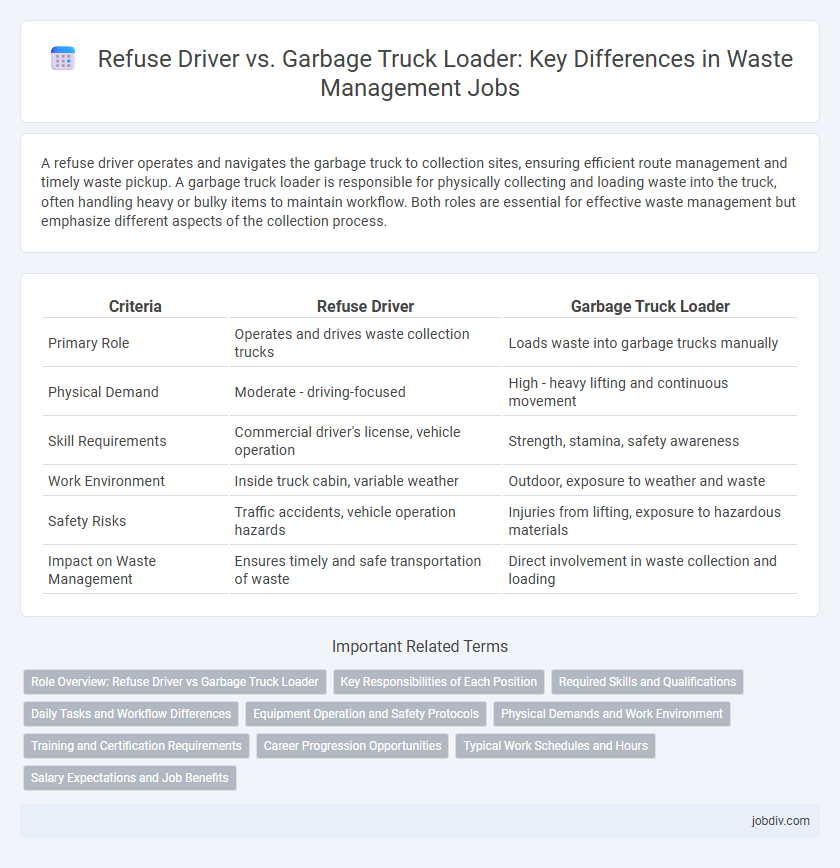A refuse driver operates and navigates the garbage truck to collection sites, ensuring efficient route management and timely waste pickup. A garbage truck loader is responsible for physically collecting and loading waste into the truck, often handling heavy or bulky items to maintain workflow. Both roles are essential for effective waste management but emphasize different aspects of the collection process.
Table of Comparison
| Criteria | Refuse Driver | Garbage Truck Loader |
|---|---|---|
| Primary Role | Operates and drives waste collection trucks | Loads waste into garbage trucks manually |
| Physical Demand | Moderate - driving-focused | High - heavy lifting and continuous movement |
| Skill Requirements | Commercial driver's license, vehicle operation | Strength, stamina, safety awareness |
| Work Environment | Inside truck cabin, variable weather | Outdoor, exposure to weather and waste |
| Safety Risks | Traffic accidents, vehicle operation hazards | Injuries from lifting, exposure to hazardous materials |
| Impact on Waste Management | Ensures timely and safe transportation of waste | Direct involvement in waste collection and loading |
Role Overview: Refuse Driver vs Garbage Truck Loader
Refuse drivers are responsible for operating waste collection vehicles, navigating routes, and ensuring timely pickup of refuse while maintaining safety protocols. Garbage truck loaders physically handle waste by loading it into the truck, often requiring manual lifting and adherence to health and safety standards. Both roles are essential in waste management, combining operational skills and physical labor to optimize efficient refuse collection.
Key Responsibilities of Each Position
Refuse drivers are primarily responsible for operating waste collection vehicles, ensuring safe navigation through designated routes and timely pickup schedules. Garbage truck loaders focus on manually loading refuse into trucks, maintaining safety protocols, and managing waste segregation on-site. Both roles require coordination to maximize operational efficiency in waste collection services.
Required Skills and Qualifications
Refuse drivers require a commercial driver's license (CDL) with a clean driving record, strong knowledge of vehicle operation, and excellent spatial awareness to maneuver large trucks safely. Garbage truck loaders need physical stamina, the ability to lift heavy loads repeatedly, and teamwork skills to efficiently collect and compact waste. Both roles demand adherence to safety protocols and environmental regulations to ensure proper waste management and public safety.
Daily Tasks and Workflow Differences
Refuse drivers are primarily responsible for operating garbage trucks, maneuvering through routes efficiently, and ensuring timely collection of waste, while garbage truck loaders focus on manually or mechanically loading waste into the truck, managing heavy lifting and sorting recyclable materials. Daily tasks for refuse drivers emphasize route navigation, vehicle safety inspections, and communication with dispatch, whereas loaders concentrate on handling waste containers, maintaining cleanliness around collection points, and assisting with truck maintenance. Workflow differences highlight drivers' role in transportation and logistics, contrasting with loaders' emphasis on physical labor and waste handling during collection.
Equipment Operation and Safety Protocols
Refuse drivers operate heavy garbage trucks, managing vehicle control, route navigation, and waste compaction systems to ensure efficient collection. Garbage truck loaders focus on manual handling of waste, utilizing hydraulic lifts and safety gear to minimize injury risks during loading processes. Both roles require strict adherence to safety protocols, including proper use of personal protective equipment (PPE) and regular equipment inspections to prevent accidents.
Physical Demands and Work Environment
Refuse drivers primarily operate heavy vehicles, requiring significant physical endurance for driving long routes and occasional manual handling of equipment under varying weather conditions. Garbage truck loaders engage in strenuous lifting, carrying, and repetitive motions while collecting waste, often exposed to hazardous materials and noisy environments. Both roles demand high levels of physical stamina and resilience to work safely in outdoor, dynamic, and sometimes challenging waste management settings.
Training and Certification Requirements
Refuse drivers must obtain a commercial driver's license (CDL) with specific endorsements for operating heavy-duty garbage trucks, while garbage truck loaders typically require training in waste handling safety and manual lifting techniques without a CDL. Refuse driver certification programs emphasize vehicle operation, hazardous material awareness, and route navigation, whereas loaders focus on occupational safety and proper waste segregation. Both roles require compliance with Occupational Safety and Health Administration (OSHA) standards to minimize workplace injuries and ensure efficient waste collection.
Career Progression Opportunities
Refuse drivers often have clearer career progression opportunities compared to garbage truck loaders due to their specialized skills in vehicle operation and route management. Advancing from a loader to a driver typically requires passing commercial driving tests and gaining experience, which can lead to higher pay and supervisory roles. Career growth for refuse drivers may also include positions like fleet supervisor or waste management coordinator, offering broader responsibilities within the waste management industry.
Typical Work Schedules and Hours
Refuse drivers typically work fixed shifts ranging from 6 to 10 hours per day, often starting early in the morning to optimize route efficiency. Garbage truck loaders may have more variable schedules due to physical demands and potential overtime during peak collection periods. Both roles frequently require weekend and holiday shifts to maintain consistent waste collection services.
Salary Expectations and Job Benefits
Refuse drivers typically earn higher salaries than garbage truck loaders, with average annual wages ranging from $45,000 to $60,000 compared to $30,000 to $40,000 for loaders. Drivers often receive more comprehensive job benefits such as health insurance, retirement plans, and paid time off due to their increased responsibility and certification requirements. Garbage truck loaders benefit from physically active roles with opportunities for overtime pay but generally have fewer benefits and lower base salaries.
Refuse Driver vs Garbage Truck Loader Infographic

 jobdiv.com
jobdiv.com